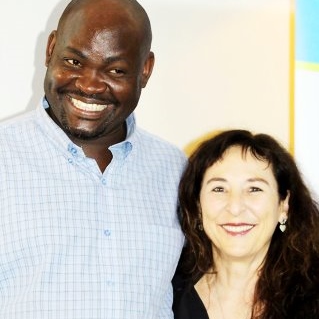
News

Fighting to free an innocent prisoner
SUZANNE BELLING
Carolyn Raphaely, a senior journalist at the Wits Justice Project (WJP), told the story at a Union of Jewish Women event recently of his conviction and titanic struggle, in the face of seemingly insurmountable obstacles, to prove his innocence.
For her, the story started four years ago, when Levi Maphakane, a warder at the Zonderwater prison, phoned her. He told her that for the first time ever he believed an inmate who insisted he was innocent – a view supported by Molaudzi’s family, friends and co-accused.
Molaudzi had been trying without success for over eight years to obtain his trial transcripts, which was his constitutional right. As a result, he was unable to appeal his case.
The WJP had received numerous other complaints about missing transcripts, “an issue with serious human rights implications”, Raphaely said.
“At that point, I had no idea I would learn some of my greatest life lessons – about patience, perseverance, persistence, courage, determination and resilience, from a man behind bars, wearing an orange uniform.”
Molaudzi’s nightmare began in 2002, when Dingaan Makuna, a Mothutlung policeman, was killed in a botched hijacking. Eight men, including Molaudzi, were rounded up and arrested.
“During two ID parades, the policeman’s daughter, who witnessed her father’s murder, fingered four suspects. Thembekile, an easily identifiable two-metre giant of a man with an imposing presence, was not one of them,” Raphaely said.
But he was convicted and sentenced, after “a bungled police investigation”, with little evidence to incriminate him, other than a recanted confession by a co-accused who was later termed a “reckless liar” by the full bench of the North-West High Court.
His search for his transcripts proved fruitless for many years. When he received a transcript – after his family managed to raise R21 000 to pay private attorneys to find them, although inmates are legally entitled to their records at state expense – more than half the 1 000-page record was missing, including the most crucial evidence.
“With only a grade 10 education under his belt, Thembekile spent his time studying the Constitution, the Criminal Procedure Act and advising other inmates of their rights.
“Armed with only prayers, faith and the courage of his convictions, he soldiered on, bolstered by an overwhelming need to prove his innocence and be reunited with his wife, Paulina, and young son, Mark, who was three months old when he was arrested.’’
Eventually, under pressure from Lawyers for Human Rights, the trial judge, Monica Leeuw – now the North-West judge-president – ordered the trial records to be retranscribed.
Three weeks after receiving the record, Molaudzi was finally in a position to appeal, which he did, with six of his co-accused. However, the appeal was dismissed by a full bench, as was a subsequent appeal to the Supreme Court of Appeal.
At this stage, Legal Aid said they could not assist him any further.
“Undeterred, he roped in a former prosecutor to help him lodge a Constitutional Court appeal, but this was also dismissed because the court said no constitutional issues were raised and the case “had no reasonable prospect of success”.
Molaudzi still did not give up hope. Two of his co-accused then launched their own Constitutional Court appeal, this time based on a constitutional principle.
Nigel Carpenter, the state prosecutor, told the court that the only evidence implicating the two of them was inadmissible and unconstitutional, adding that the same applied to Molaudzi as well.
The court overturned the convictions of the two co-accused, but there was a legal difficulty facing Molaudzi. According to the legal principle of res judicata, “you can have only one bite at the legal cherry”, Raphaely explained.
The court had heard and dismissed Molaudzi’s application two years earlier. But three months later, “in the interests of justice, the court decided to reverse its own ruling for the first time ever. He walked out a free man, going on to achieve the same result for two other co-accused.”
Raphaely admired Molaudzi’s magnanimity – he “harbours no bitterness towards [the judge]. ‘To err is human.’”
Raphaely said this case was “a salutary lesson for those still calling for the reinstatement of the death sentence.
“Not only guilty people find themselves behind bars.”
Following on Raphaely’s address, Molaudzi said he had written many letters, “but they were thrown into the dustbin”. Nevertheless, he continued the fight, saying his body might have been inside prison, but his soul was outside. He prayed constantly.
He told the SA Jewish Report that he had received no compensation. He is still trying in that regard.




